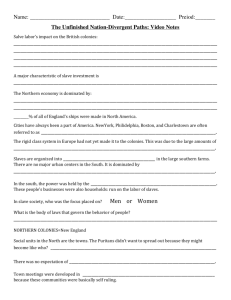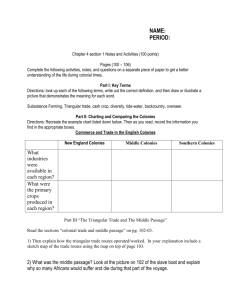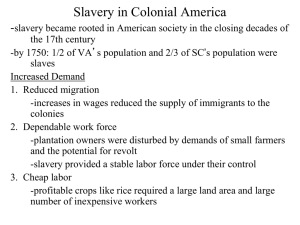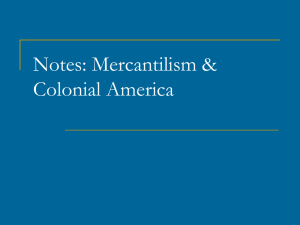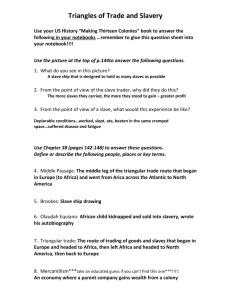Notes Ch. 4 “Life in the American Colonies” Name: Per:
advertisement
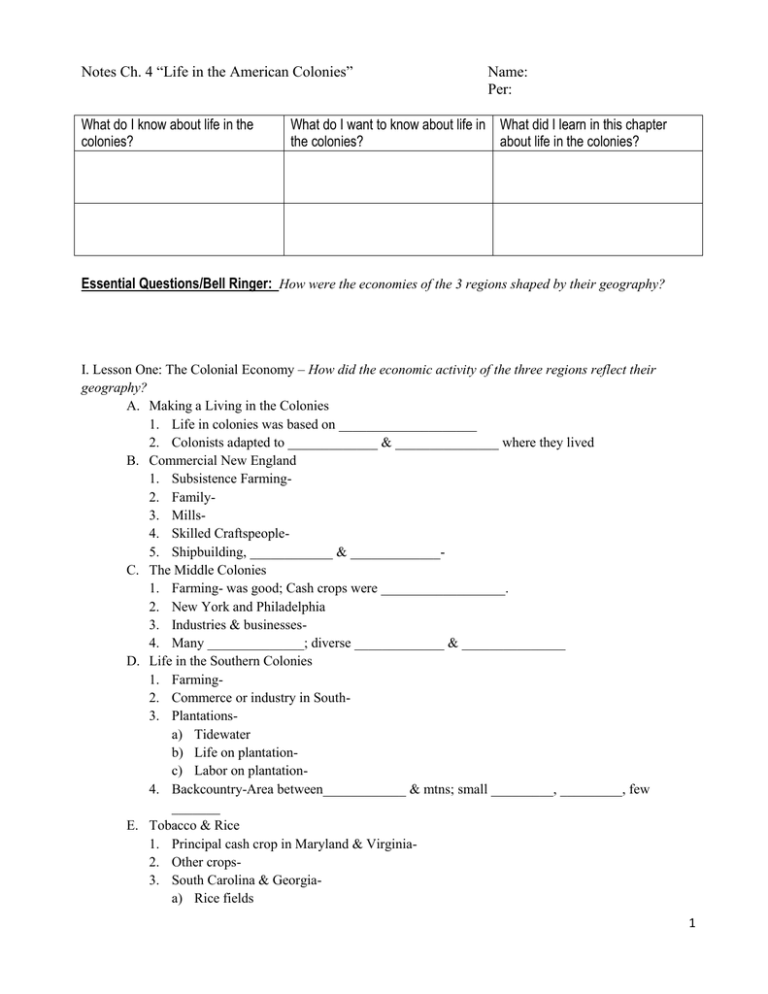
Notes Ch. 4 “Life in the American Colonies” What do I know about life in the colonies? Name: Per: What do I want to know about life in What did I learn in this chapter the colonies? about life in the colonies? Essential Questions/Bell Ringer: How were the economies of the 3 regions shaped by their geography? I. Lesson One: The Colonial Economy – How did the economic activity of the three regions reflect their geography? A. Making a Living in the Colonies 1. Life in colonies was based on ____________________ 2. Colonists adapted to _____________ & _______________ where they lived B. Commercial New England 1. Subsistence Farming2. Family3. Mills4. Skilled Craftspeople5. Shipbuilding, ____________ & _____________C. The Middle Colonies 1. Farming- was good; Cash crops were __________________. 2. New York and Philadelphia 3. Industries & businesses4. Many ______________; diverse _____________ & _______________ D. Life in the Southern Colonies 1. Farming2. Commerce or industry in South3. Plantationsa) Tidewater b) Life on plantationc) Labor on plantation4. Backcountry-Area between____________ & mtns; small _________, _________, few _______ E. Tobacco & Rice 1. Principal cash crop in Maryland & Virginia2. Other crops3. South Carolina & Georgiaa) Rice fields 1 b) Work in fields F. Growth of Slavery- Why were enslaved Africans brought to the colonies? 1. Slavery in West Africa2. Slave Trade3. The Middle Passage- Across the ____________ Ocean a) Triangular Tradeb) Conditions on slave shipsc) Slave Market4. Life of a Slave a) House slavesb) Field slavesc) Slave codes-___________ to control slaves 1). Slaves could not leave plantation without permission of ____________ 2). Some codes made it illegal to teach slaves to ____________________ d) Punishmentse) Familiesf) Some learned skilled ___________ and a few bought their ____________. 5. Critics of Slavery6. Olaudah Equiano- wrote _______________ of slave life from Africa to __________. II. Lesson 2: Colonial Government- Bell Ringer: “How do new ideas change the way people live?” A. English Principles of Government 1. Protected Rights a. Magna Carta-King John gave English people protection against _______________ b. King must follow the ___________ & respect rights of the ______________. 2. Representative Government a. People _____________ delegates to make the laws and conduct ____________. b. Parliament-2 Houses (______________ & ______________) c. Glorious Revolution 1). Power struggle between King James II and _________________ 2). King forced out & replaced by __________&_________ who agreed that the king should not be more powerful than the _______________. 3. English Bill of Rights a. The king’s power was limited-the ruler could not suspends _____________ laws, impose ___________ or raise an ___________ without Parliament’s consent. b. Members of Parliament had to be ___________, citizens had the right to a ___________ trial, and protection from ____________________________. 4. Government in America a. Charter Colonies-based on a charter, or _____________________ by monarch. (example__________________) b. Proprietary Colonies-property of _______________ who ruled as they wished (example_________________) c. Royal Colonies-under direct English control; Governor & upper house or council appointed by ___________________, lower house selected by ______________. 2 d. Power in the hands of white men who owned ________________. 5. Local Government in the Colonies-Town Meetings-where townspeople discussed local ____________ 6. Freedom of Speech & Press a. John Peter Zenger-jailed for publishing criticism of _____________ of New York b. Defense-the _______________ is defense against _____________. B. English Economic Policies “How did the colonists react to English economic policies?” 1. Mercantilisma. Countries must _______________ more than it _______________ b. Countries need colonies for __________________ & market for _________________. 2. English colonies in America provided many raw materials & bought English goods: a. Examples of raw materialsb. Goods bought3. Navigation Acts a. Forced colonists to sell to _______________ b. Goods from other countries went to England, were ____________, then to colonies. c. Trade goods had to be shipped on _____________________. 4. Colonial Resistance- Colonists eventually resisted these laws by ______________________. VIDEO NOTES: Witches of Salem 1. What caused people in Salem to begin accusing fellow townspeople of being witches? 2. Who were some of the people accused of being witches? 3. Who were the people making the accusations? 4. What are some examples of evidence used against the accused? 5. What were the results of the Salem Witch Trials? 6. Could there be a trial like the Salem Witch Trials today? Why or why not? Video Notes: Slavery and the Making of America pt. 1 SLAVERY IN NEW AMSTERDAM 1. What were conditions like for slaves in Dutch New Amsterdam in the 1600’s? 2. What was meant by the term “half-free?” SLAVERY IN THE CHESAPEAKE BAY REGION (VIRGINIA & MARYLAND) 3. What were conditions like for slaves in this region? 3 4. What happened to an indentured servant named John Punch, and why was this important? 5. The Driggus family…. Emmanuel Driggus What determined if a child born was to be a slave or free? What problems did Frances Driggus face as a slave and as a free person? What options did free blacks have? BUSINESS OF SLAVE TRADING. 6. Where did the slave traders get the slaves? 8. What businesses benefited from the slave trade? 9. What were conditions like on slave ships? SULLIVAN ISLAND 10. What was the importance of spirituality and culture to the slaves? 11. How did they get slaves ready for the auction block? 12. What were conditions like in the rice fields (paddies) in South Carolina? 13. What were the punishments for runaway slaves? 14. How did slaves resist? 15.What was the Stono Rebellion? Why did they run towards Florida? 16. What were the Black (Slave) Codes? 4

